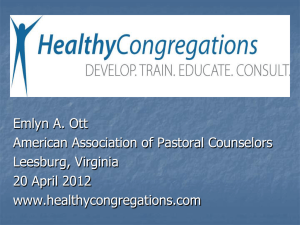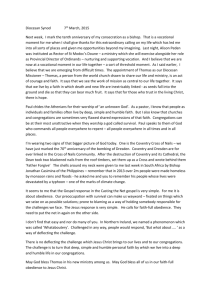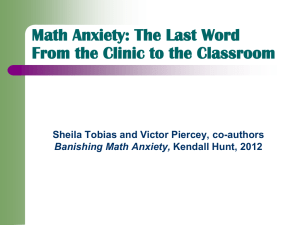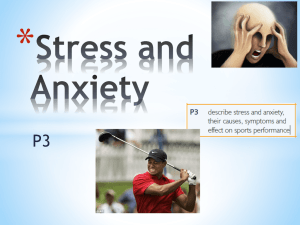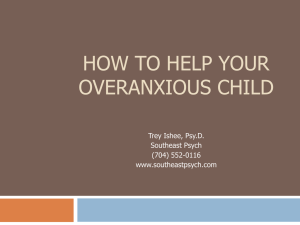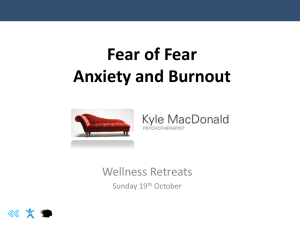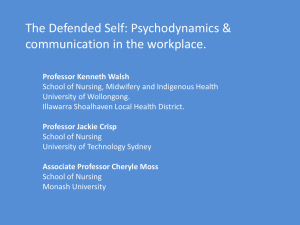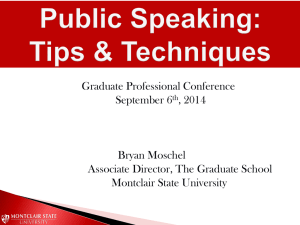A Family Systems Approach to Congregational Life
advertisement
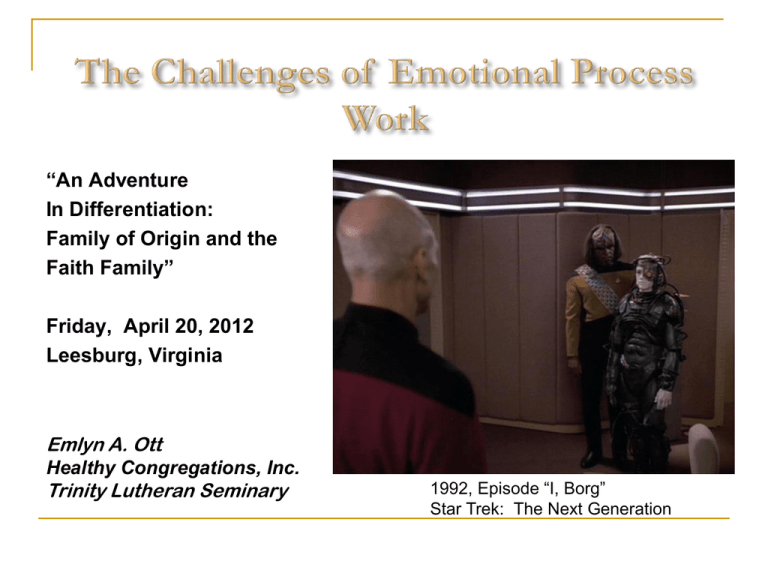
“An Adventure In Differentiation: Family of Origin and the Faith Family” Friday, April 20, 2012 Leesburg, Virginia Emlyn A. Ott Healthy Congregations, Inc. Trinity Lutheran Seminary 1992, Episode “I, Borg” Star Trek: The Next Generation Impetus to begin to look at family and congregation What keeps me going Assists along the way The on-going challenges Self to family to organization and back Our Family of Origin and Our Faith Use of the family diagram as a visual reminder of our formation Emotional process is key to our own stories. Value in being able to hear the song beneath the words of our family stories Ability to observe ourselves is part of spiritual and emotional maturity Multigenerational experiences form our shaping of the world—and the drives and hopes that create great passion in us Variables within the transmission include events at nodal times (birth, death, divorce, conflict), changes in society and situations that absorb anxiety Anxiety ramped up; disequilibrium Painful changes in relationships Avoidance of the work while looking as though the work was being done! Working on family while working on significant changes in roles in two organizations Parallel process between “faith families” and “families of origin” How could Bowen family systems theory be introduced with integrity to seminary students? How could Healthy Congregations develop a next step to its presence in religious organizations? Financially self-sustaining Inclusion of new aspects (membership, theory groups, family of origin work) Training people to lead workshops that encourage broad capacities for leadership in congregations Process of organization making use of theory in Board and staff meetings Development of separate but connected identity with seminary and with other people working in Bowen/Friedman thinking Leadership Lab for students Intersection of education for ministry leadership and congregations Clergy/laity/students experience bumping up against people engaged in a life-long endeavor to be a thoughtful, integrated, believing leader Varieties of educational and experiential learning all focused on the on-going work of differentiation (didactic, theoretical, case studies, family of origin) Making the best use of thinking for oneself; creating opportunities for that work to proceed with ground rules for interaction Integrating resources of faith as expressions of understanding personal and corporate belief, action, and deepening relationships with God and the world Ch-ch-ch change is not what appears to be at the heart of anxiety. If anxiety is an expression of a threat, real or imagined, then anxiety seems to be forming around the presence or avoidance of pain. Multiplication of the f-words expresses this: fight, flight— but also: freeze, fuse, frenzy, fornicate Karen Armstrong adds: feeding And---pharmacology…in the spirit of f-words See the Process Draw a picture (or look at pictures) Move into an observer role Observe processes near and far Stay in the relationships What Happens When Anxiety Descends? The Book of Job and Differentiation of Self Job’s experience as universal Incredible loss, anger, outrage Everything intensifies; inability for one to see the bigger picture of the situation Opens Job’s experience up for us to view as mirroring our own Making former power/blessings useless in the process Could conflict be an indicator of the beginning of a deeper relationship? Rejection of the experience of blame (emotional projection) Might fusion (right relationship) set us up for bitterness in the midst of a life of free will and autonomy in the world? Rain falls on the just and unjust alike. The view of God as a purveyor of lessons gets overturned Though we may be immersed in pain, God is not stuck Job complains, gets angry, accuses, calls on God to act—yet never lets go of the relationship. And it gets more complicated the more people and emotions that are engaged in the process. Emotional Cut-off and Fusion --Job’s Wife --Job’s Friends --What about with God? Process: each speak without interruption or questions Describe a personal experience where you can identify with some of the relationship losses, changes or intensities described in the Book of Job. What observation would you have in your own story about: What raised yours or others anxiety? Where was the intensity? How did triangles, cut off, fusion or projection function in this situation? In what ways did your relationship with God or others change? Or remain the same? Or begin a transition? To live in relationship is to live in the paradox of pain and hope; we have been created by God to be in relationship With important relationships come challenges—the more important the relationship, the tougher the challenges A relationship with God brings with it the challenge to shake a fist and stay connected Biblical witness tells the story of the comfort and challenge of being a community that lives into what it believes; that is when differentiation of self is given room to grow in communities of faith A challenge: to live into a relationship with a Holy Other that manages, deals with and regulates pain with self and members of the community The Practice of Feeling Pain There will always be people who run from any kind of pain and suffering, just as there will always be religions that promise to put them to sleep. For those willing to stay awake, pain remains a reliable altar in the world, a place to discover that a life can be as full of meaning as it is of hurt. The two have never cancelled each other out and I doubt they ever will, or at least not until each of us—or all of us together—find the way through. Barbara Brown Taylor An Altar in the World page 173 Individuals, families and communities can be invested in a life-long courageous search to define beliefs, stay connected to God and significant people and communities without anger or entrenched dogma. Energy goes to determining one’s own sense of responsibility rather than defining someone else’s. Multiple opinions can be known, challenged and incorporated and the irresponsible words, perspectives or actions of others do not set the agenda for individuals or the group. Emlyn Ott


